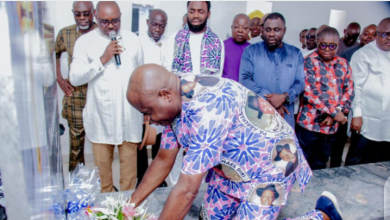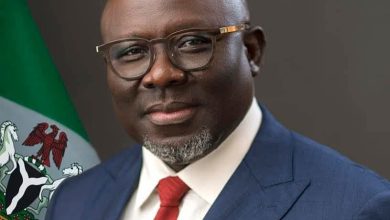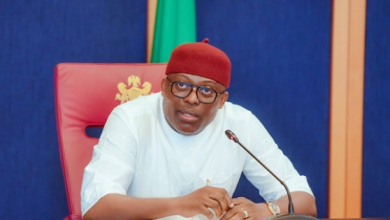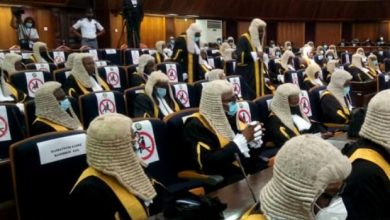Niger Delta
Oborevwori Charts New Path For Delta’s Healthcare, Infrastructure, Security Reforms

By Festus Ahon @highlight
In a series of high-impact events that have drawn widespread commendation, Delta State Governor, Rt. Hon. Sheriff Oborevwori, has continued to stamp his administration’s footprint across health, Education, infrastructure, and security sectors marking a pivotal moment in the state’s journey toward sustainable development.
In Warri, the state’s economic nerve center, Governor Oborevwori on Wednesday, commissioned a multi-billion naira consignment of medical equipment aimed at revamping the public healthcare system.
The ceremony, held at the Central Hospital Warri, signaled a major investment in the state’s medical infrastructure. With a delivery that includes eight hemodialysis machines, 25 user-friendly 4D ultrasound scanners, and two German-made CT scan machines, the project is designed to improve diagnostic precision and patient outcomes in government-owned hospitals across all three senatorial districts.
Governor Oborevwori, joined by Minister of Aviation and Aerospace Development, Festus Keyamo, SAN, emphasized that each local government area in Delta would receive one of the ultrasound machines.
He noted that this distribution was not just symbolic but a transformative initiative aimed at reducing maternal and infant mortality across the state and disclosed that the state government, through the Ministry of Health, would initiate training programs for health workers to ensure optimal use of the new devices.
The upgrades go beyond primary healthcare. The installation of CT scan and orthopedic theatre equipment in Warri’s central hospital underlines a broader push to provide specialist services within the state. Governor Oborevwori affirmed that the initiative is anchored in the belief that “health is wealth,” pledging to make quality and affordable healthcare accessible to all Deltans.
Simultaneously, the governor used the occasion of his second year anniversary in office to inaugurate series of road projects in Warri South Local Government Area. The projects span critical urban routes such as the Upper and Lower Erejuwa Roads, General Hospital Road, Ajamimogha/Mabiaku link road, and roads within Ogunu and Ugbuwangue communities. These thoroughfares, some of which had been in deplorable condition for years, have now been reconstructed to foster economic activity and ease movement.
Addressing residents at the inauguration, Governor Oborevwori stressed that the road projects are part of a larger urban renewal initiative. He reaffirmed his administration’s commitment to restoring the historic glory of Warri and Effurun, noting that three major flyovers under construction by Julius Berger are on track for completion in the first quarter of next year. The governor also spoke on the much-anticipated Warri Stadium reconstruction, stating that although land constraints had delayed the project, contract has now been awarded and completion is expected in early 2026.
Calling on residents to maintain peace and avoid actions that could inflame political or ethnic tensions, the governor addressed the controversy surrounding recent ward delineation exercises in the Warri Federal Constituency.
He urged all stakeholders to remain calm and law-abiding while federal authorities work to resolve the matter. He extended the same message of restraint to the youth, encouraging them to take advantage of vocational training programs offered by the state to acquire skills for a better future.
Governor Oborevwori also reiterated his administration’s commitment to eliminating illegal levies, popularly known as ‘Deve’, which have long hindered land development in Delta. He reminded the public that the practice was outlawed in 2018, and anyone found violating this law would face prosecution. His remarks were a firm signal to investors that Delta State is open for business in a safe and regulated environment.
In a separate but related development, the governor convened a high-level security stakeholders meeting in Asaba on Thursday to address the rising tide of violent crimes, including kidnapping and cult-related killings. In a room filled with traditional rulers, local government chairmen, lawmakers, Commissioners, and top security officers, Governor Oborevwori read the riot act. He warned that any council chairman who fails to call monthly security council meetings would face sanctions.
He declared the state government’s intention to deploy modern surveillance technologies, including crime-mapping tools and data-driven intelligence systems, to combat criminal activity.
According to him, traditional methods alone would not suffice in confronting the evolving nature of crime in Delta. He commended the efforts of conventional security agencies and called for more structured support for local vigilantes who often serve as the first line of defense in rural communities.
The governor called on community leaders and traditional rulers to collaborate fully with law enforcement agencies. He emphasized that security is a shared responsibility, and laxity at any level would not be tolerated. He further highlighted the disturbing role of drug abuse and criminal migration from neighboring states as contributors to the insecurity crisis, stating that the state is already recording victories against criminal syndicates following several coordinated raids.
In all, Governor Oborevwori’s recent moves are widely seen as part of a coordinated strategy to consolidate gains in healthcare, education, infrastructure, and security. By combining tangible investments with decisive leadership, he is laying the foundation for a more prosperous and resilient Delta State. As the state gears up for the commissioning of more projects in the coming weeks and months, expectations are high that the momentum will be sustained and that the lives of everyday Deltans will continue to improve.
#governordiary #MOREAgenda #sheriffoborevwori #progressfordelta #RenewedHope



